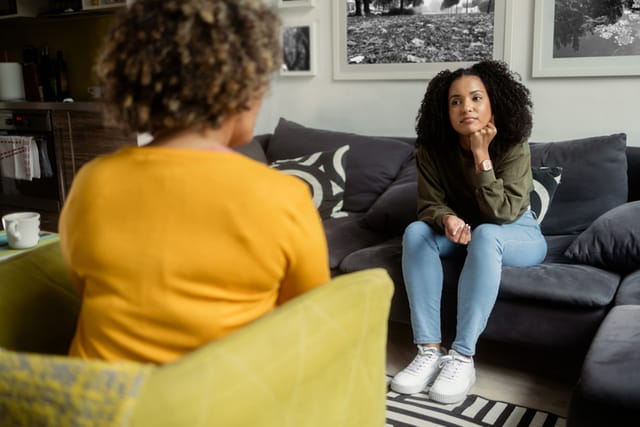Family is complex, to say the least, but while you get all the nuances and quirks of your blood relations, letting other people in on that can be a little intimidating. So, what happens when you have to explain your toxic, complicated family to someone else? Here are 17 tips for starting that conversation.
1. Know that you won’t be perfectly understood.

Coming from a toxic family, it’s very common to rarely feel like you’re being heard. When talking about it with other people, don’t expect to feel a magical sense of catharsis or relief. It’s a journey and communication is a great step in that, but protect yourself by keeping expectations low.
2. Don’t feel bad about keeping certain things to yourself.

Opening up old wounds is always going to be a challenge, and it’s not something that any random person is owed an insight into. Remember your worth and know that just because people are asking about your past doesn’t mean you have to tell them. “It’s private” is always an acceptable answer.
3. Find common ground.

It can be very isolating to have experienced a toxic family environment from a young age when you may have been exposed to substance abuse, addiction, neglect, and a host of other forms of toxicity. An antidote to this can be finding community with people who have a similar background as you. These are the groups you should seek out first.
4. Understand who’s just curious versus who actually cares.

Lots of people who haven’t grown up in a toxic family environment won’t have even a basic understanding of your experiences. They mean well, but often their interest in your life can feel performative and callous rather than coming from a place of genuine empathy. Best to avoid them initially.
5. Be clear that you don’t want sympathy.

Setting boundaries is key. Tell the person you’re talking to that you’re not expecting the world’s smallest violin to start playing in the background of your story — you’re just sharing because you trust them. You’re not opening up with these traumatic details for attention.
6. Try not to judge your family too much.

When recounting the past, sometimes our memories, when viewed in retrospect, can be altered in tone or timelines. This is natural. As our brains evolve and mature, so do our feelings about past events. Reflecting on your toxic family is challenging enough; try to take the high road and explain the situation with grace. What’s done is done – anger now doesn’t change that.
7. Stick to the facts.

A useful technique when sharing details of your toxic family is to anchor your story to factual moments or timelines. If you feel ready to, confirming the “who, what, where, when, and why” of events can ensure you keep the emotions at bay.
8. Don’t make it into a speech.

It can be challenging to not bring up all of the emotional baggage associated with these toxic memories. To avoid opening up old wounds, keep the story short and simple and know that you control the narrative. You don’t have to go deep if that’s not what you feel comfortable with.
9. Pull the Uno reverse card.

If you’re feeling like all eyes are on you, or if you notice that certain members of the group seem to be engaging more than others, it could mean that they have shared experiences, but haven’t felt able to talk about them yet. This is a good opportunity to have a meaningful discussion while also taking the pressure off you.
10. If you’re uncomfortable, stop the conversation.

It’s as simple as that. No one has a right to your trauma. If you aren’t ready, you don’t need to talk about it. You should only ever open up about your life when you feel you’re in a safe space with someone you can trust. Until that’s the case, you shouldn’t feel pressured to share.
11. Articulate that you are not your family.

The challenge when talking about people close to us is that you feel like your audience will judge you as a consequence. We fear that, by revealing our complex, flawed past, people might think that you have grown up to be the same. Remind your friends that you saw through your family’s toxicity and rose above it.
12. Tell people that loving and liking your family are two different things.

It is often the people who grew up with white picket fences and manicured lawns that have the hardest time understanding the realities of a toxic household. A good phrase to have to hand is the fact that loving and liking your family are two separate things. This is a great reminder for yourself, as well.
13. Be clear that you expect discretion.

Talking about your family is always a vulnerable act — and a choice granted to people you trust. Make it clear that it is still a sensitive topic and that you don’t want your business shared beyond the circle. It should go without saying, but it’s still good to reiterate.
14. Talk about what you’ve learned from your experiences.

It can be nice to temper some of the negativity with a note of reflection at the end by sharing how you learned independence and critical thinking skills from your experiences. You can show how much you have grown.
15. Be raw.

If you trust your people, then be unflinching in your recollections. You shouldn’t feel like you have to protect your family’s reputation or other people’s perceptions. Talking about trauma will help you continue to process what happened, and letting people in is the first step to accepting their help rather than fearing their judgment.
16. Issue PSAs about future conversations about your family.

Tell your friends that just because you’re talking about your family experiences now, doesn’t mean that you will always be ready to talk. You will come to them again when the time is right, not the other way around.
17. Explain that you’re still on a journey.

People don’t simply heal from childhood trauma overnight, nor should anyone be expected to. Caution your friends that some days you’ll struggle more than others, and that you will need their support. This way you gain a resource in the future.
Enjoy this piece? Give it a like and follow Bolde on MSN for more!


